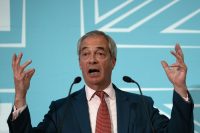Sixteen months ago Rishi Sunak was installed as Conservative leader and prime minister in the hope that he would be able to turn his party’s fortunes around in the wake of the damage inflicted on the party’s popularity by Liz Truss’ ‘fiscal event’.
However, Thursday’s by-elections confirm the message of the polls that Mr Sunak has made little or no progress in bringing that hope to fruition.
True, at 21 points the fall in Conservative support in Kingswood since 2019 was less than the drops in the three by-elections the party lost to Labour last year in Mid-Bedfordshire, Selby and Tamworth. But it was still no better than the drop implied by the party’s current standing in the polls, which, at 26 per cent, is up just one point on the position Mr Sunak inherited in the autumn of 2022, and is as much as 19 points down on its vote in 2019.
But the outcome was much worse in Wellingborough. The party’s support was down by nearly 38 points, making it the biggest fall in Conservative support in any by-election where the party was trying to defend the seat. True, the local circumstances surrounding that by-election – the bullying allegations against Peter Bone and the decision to nominate his partner as the Tory candidate – may well have affected the Tory performance, but it is unlikely to be the whole explanation.
Not surprisingly, Conservative spokespersons tried to make the best of a bad job. In truth they had a near impossible task. For example, the Prime Minister argued that governments regularly do badly in mid-term by-elections. Trouble is, we are no longer in the middle of this parliament, but rather in its dying months. By now there should be signs of recovery.
True, the government is right to argue that we should compare by-elections and not attempt to extrapolate them into a possible general election result. And voters do sometimes use by-elections to protest against the incumbent government safe in the knowledge that voting for the opposition will not turf it out of office. But governments do not usually lose as many by-elections as the Conservatives have done in this parliament or regularly suffered such large swings.
The government has now lost nine by-elections since 2019. True they gained a seat in Hartlepool in May 2021, but the net loss of eight seats matches is the highest loss by a government since the 1992-7 parliament. And that did not end happily for John Major. History may not necessarily repeat itself, but it certainly hangs like a dark cloud over the Conservatives prospects.
A familiar argument about low turnout was also deployed. As in the wake of the by-election defeats last autumn Conservatives argued that the fact that so few voters made it to the polls – just 37 per cent on Kingswood and 38 per cent in Wellingborough shows that there is little enthusiasm for Labour and that the party can reasonably hope to win back those who stayed at home.
There is a problem about turnout. It has fallen on average by 28 points in by-elections in this parliament – a post-war record high. The last time the drop was almost that big, in 1997-2001, turnout at the subsequent general election slumped to an all-time low of 59 per cent.
That suggests that rather returning to the polls at the general election, many of the voters who the Conservatives hope to win back may still stay at home. More broadly, the real message from the persistently low turnouts is that all the parties are struggling to engage an electorate that is discontented, pessimistic about the future, and worried about the state of the NHS. This is a challenge facing all those who hope to govern us, not a problem for Labour alone.
True, there are other signs that the level of enthusiasm for Labour does not match the depth of the discontent with the Conservatives. In both Kingswood and Wellingborough the increase in Labour’s share of the vote was only half the fall in Conservative support. While many voters might want change, as Sir Keir Starmer agues, not all of those that do want change regard Labour as the solution.
Yet this is not necessarily good news for the Conservatives. Rather it underlines the message of recent polls that Reform is also now also a threat to the Conservatives’ prospects. The polls suggest that Reform is now winning over as many 2019 Conservative voters as Labour. And now, in winning 10 per cent of the vote in Kingswood and 13 per cent in more Eurosceptic Wellingborough, for the first time Reform’s by-election performance matched the message of the opinion polls. And those votes accounted for much of the other half of the decline in Conservative support that was not claimed by Labour.
As a result, rather than just concentrating his firepower on Labour, Rishi Sunak now finds himself having to fight on two fronts – Labour to his left and Reform to his right. Finding a political message that will appeal to both groups could prove quite a challenge. In short, not only do the by-elections confirm that the Conservatives remain in a deep hole, but they also suggest that the road to recovery has just got even steeper.






Comments